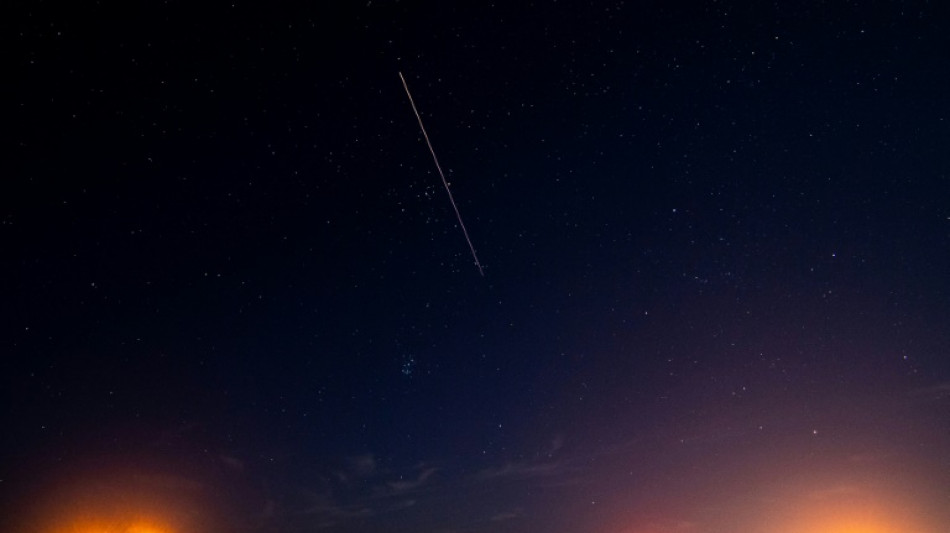
-
 Moscow revels in Trump's Greenland plans but keeps concerns quiet
Moscow revels in Trump's Greenland plans but keeps concerns quiet
-
Global tourism hit new record level in 2025: UN

-
 Senegal poised to party with parade honouring AFCON champs
Senegal poised to party with parade honouring AFCON champs
-
Osaka emerges for Melbourne opener under hat, veil and parasol

-
 Dogsled diplomacy in Greenland proves elusive for US
Dogsled diplomacy in Greenland proves elusive for US
-
Almost half of Kyiv without heat, power, after Russian attack

-
 EU vows 'unflinching' response to Trump's Greenland gambit
EU vows 'unflinching' response to Trump's Greenland gambit
-
Osaka steals show at Australian Open as Sinner strolls through

-
 Brignone impresses in first run of Kronplatz giant slalom in World Cup comeback
Brignone impresses in first run of Kronplatz giant slalom in World Cup comeback
-
Osaka emerges for Melbourne opener under white hat and umbrella

-
 Malawi suffers as US aid cuts cripple healthcare
Malawi suffers as US aid cuts cripple healthcare
-
Bessent says Europe dumping US debt over Greenland would 'defy logic'

-
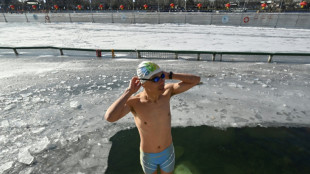 Freeze, please! China's winter swimmers take the plunge
Freeze, please! China's winter swimmers take the plunge
-
Talks between Damascus, Kurdish-led forces 'collapse': Kurdish official to AFP

-
 In-form Bencic makes light work of Boulter at Australian Open
In-form Bencic makes light work of Boulter at Australian Open
-
Spain mourns as train disaster toll rises to 41

-
 Sinner into Melbourne round two as opponent retires hurt
Sinner into Melbourne round two as opponent retires hurt
-
Israel begins demolitions at UNRWA headquarters in east Jerusalem
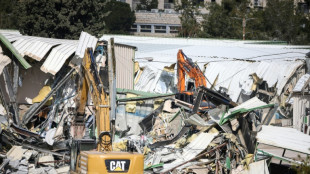
-
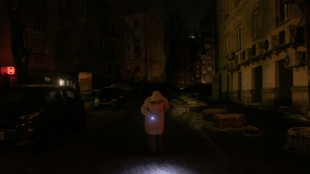 Almost half of Kyiv without heat, power, after Russian attack: govt
Almost half of Kyiv without heat, power, after Russian attack: govt
-
Veteran Monfils exits to standing ovation on Australian Open farewell

-
 Precision-serving former finalist Rybakina powers on in Melbourne
Precision-serving former finalist Rybakina powers on in Melbourne
-
South Korea's women footballers threaten boycott over conditions

-
 Equities sink, gold and silver hit records as Greenland fears mount
Equities sink, gold and silver hit records as Greenland fears mount
-
Australian lawmakers back stricter gun, hate crime laws

-
 EU wants to keep Chinese suppliers out of critical infrastructure
EU wants to keep Chinese suppliers out of critical infrastructure
-
AI reshaping the battle over the narrative of Maduro's US capture

-
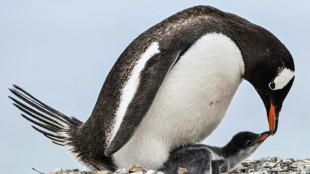 Penguins bring forward breeding season as Antarctica warms: study
Penguins bring forward breeding season as Antarctica warms: study
-
Vietnam leader pledges graft fight as he eyes China-style powers

-
 Ukrainian makes soldier dad's 'dream come true' at Australian Open
Ukrainian makes soldier dad's 'dream come true' at Australian Open
-
'Timid' Keys makes shaky start to Australian Open title defence

-
 Indiana crowned college champions to complete fairytale season
Indiana crowned college champions to complete fairytale season
-
South Koreans go cuckoo for 'Dubai-style' cookies

-
 Harris leads Pistons past Celtics in thriller; Thunder bounce back
Harris leads Pistons past Celtics in thriller; Thunder bounce back
-
Tjen first Indonesian to win at Australian Open in 28 years

-
 Long-delayed decision due on Chinese mega-embassy in London
Long-delayed decision due on Chinese mega-embassy in London
-
Djokovic jokes that he wants slice of Alcaraz's winnings

-
 Trump tariff threat 'poison' for Germany's fragile recovery
Trump tariff threat 'poison' for Germany's fragile recovery
-
Tourists hit record in Japan, despite plunge from China
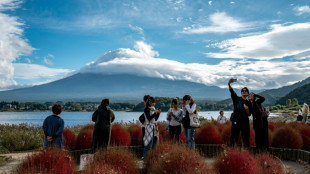
-
 Jittery Keys opens Melbourne defence as Sinner begins hat-trick quest
Jittery Keys opens Melbourne defence as Sinner begins hat-trick quest
-
The impact of Trump's foreign aid cuts, one year on

-
 Belgian court weighs trial for ex-diplomat over Lumumba killing
Belgian court weighs trial for ex-diplomat over Lumumba killing
-
Inside China's buzzing AI scene year after DeepSeek shock

-
 Asian markets sink, silver hits record as Greenland fears mount
Asian markets sink, silver hits record as Greenland fears mount
-
Shark bites surfer in Australian state's fourth attack in 48 hours

-
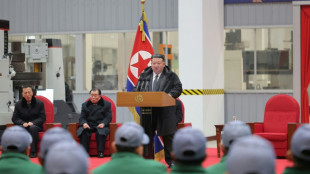 North Korea's Kim sacks vice premier, rails against 'incompetence'
North Korea's Kim sacks vice premier, rails against 'incompetence'
-
Spain mourns as train crash toll rises to 40

-
 'Very nervous' Keys makes shaky start to Australian Open title defence
'Very nervous' Keys makes shaky start to Australian Open title defence
-
Vietnam leader promises graft fight as he eyes China-style powers

-
 Dad-to-be Ruud ready to walk away from Australian Open
Dad-to-be Ruud ready to walk away from Australian Open
-
North Korea's Kim sacks senior official, slams 'incompetence'
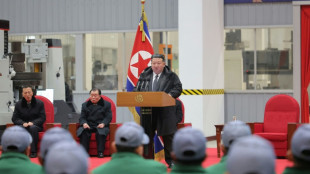

RNA base in asteroid samples suggests origins of life on Earth: study
The black particles from an asteroid some 300 million kilometres away look unremarkable, like pieces of charcoal, but they hold a component of life itself.
Scientists have discovered the chemical compound uracil, one of the building blocks of RNA, in just 10 milligrammes of material from the asteroid Ryugu, according to new research published on Tuesday.
The finding lends weight to a longstanding theory that life on Earth may have been seeded from outer space when asteroids crashed into our planet carrying fundamental elements.
It is some of the latest research from analysis of 5.4 grams of rocks and dust gathered by the Hayabusa-2 probe from the asteroid Ryugu.
Hayabusa-2 was launched in 2014 and returned to Earth's orbit in late 2020 with a capsule containing the sample from the asteroid.
The precious cargo was divided between international research teams and has already yielded several insights, including that some of life's building blocks, amino acids, may have been formed in space.
The first drop of water discovered in a near-Earth asteroid has also been found among the samples.
The new research, published Tuesday in the journal Nature Communications, went looking for another foundation of life: the nucleobases of RNA.
While DNA, the famed double helix, functions as a genetic blueprint, single-strand RNA is an all-important messenger, converting the instructions contained in DNA for implementation.
Like DNA, it is made up of bases: adenine, guanine, cytosine, and uracil.
Scientists have previously found some or all of these bases in different asteroids that landed on Earth as meteorites. However, they could not be sure the chemicals came from outer space or were contaminated when they landed.
"Since every meteorite has landed on the surface of the Earth where microorganisms are ubiquitously present everywhere, it always makes the interpretation on the origin of such biologically important molecules in meteorites more complex," said Yasuhiro Oba, associate professor at Hokkaido University and an author of the research.
- 'Like brewing coffee' -
Testing the Ryugu samples was a multi-phase process that began by putting them in hot water, like "brewing coffee or tea", Oba said.
Acid was then applied to extract molecules that were analysed by extremely sensitive tools capable of detecting the minute quantities of uracil present.
The discovery offers "strong evidence that one of the RNA components has been provided to the Earth even before the emergence of life", Oba told AFP.
"We expect it plays a role for prebiotic evolution and possibly the emergence of the first life," he said.
RNA's other bases were not found in the sample, though Oba believes they could be present at levels too low to be detected with the method used to find uracil.
He hopes to analyse new samples collected from space in coming years, including Osiris-REx's material from the asteroid Bennu, expected to arrive this year.
Yoshinori Takano, a scientist at the Japan Agency for Marine-Earth Science and Technology and author of the Ryugu research, said he was also keenly awaiting the Martian Moons eXploration project, set to launch from Japan next year and return around 2029.
It will collect samples from Phobos, one of the moons of Mars.
"I am sure it will be very hotly watched by organic cosmochemists for the next 10 years," said Takano.
G.Schulte--BTB



